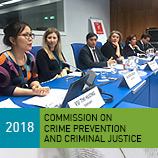 23 May 2018 - The persistence and prevalence of gender-based violence is a problem of pandemic proportions. An estimated 35 per cent of women worldwide have experienced intimate partner violence or sexual violence by a non-partner at some point in their lives.
23 May 2018 - The persistence and prevalence of gender-based violence is a problem of pandemic proportions. An estimated 35 per cent of women worldwide have experienced intimate partner violence or sexual violence by a non-partner at some point in their lives.
With a view to countering this problem, UNODC, United Nations Entity for Gender Equality and the Empowerment of Women (UN Women), United Nations Population Fund (UNFPA), United Nations Development Programme (UNDP), and the World Health Organization (WHO) organized a side event at the last week's 27th session of the Commission on Crime Prevention and Criminal Justice. Supported by the Permanent Missions of Australia, Peru and Vietnam, the event provided a platform to discuss coordinated and multi-sectoral responses to gender-based violence.
The UN entities presented an overview of the "UN Joint Programme on Essential Services for Women and Girls subject to violence", which provides guidance to countries on how to implement global norms on multi-sectoral services and responses.
Speaking on behalf of five participating entities, Claudia Baroni, Crime Prevention and Criminal Justice Officer at UNODC, said: "this Joint Programme seeks to bridge the gap between international agreements concerning responses to violence against women and services for survivors, and their implementation at the country level."
The Essential Services Package for Women and Girls Subject to Violence: Core Elements and Quality Guidelines is the main policy guidance of the Joint Programme. It outlines a series of 'essential actions' to be taken by States' health, social services, police and justice sectors. These actions are expected to secure the rights, safety and dignity of every woman and girl who has experienced violence.
At the event, selected panellists from ten pilot countries outlined their respective Governments' efforts to introduce new laws and policies, and shared good practices on the provision of essential services for women and girls.
"The number of domestic violence victims have increased in recent years. We have been facing some challenges, including the lack of awareness, capacity and the quality of services for women and girls. That is why we need cooperation", said Vu Thi Huong, Deputy Director for the National Legal Aid Agency of Viet Nam.
Also speaking, Elvia Barrios, Judge of the Supreme Court of Peru, said: "Acts of violence continue every day, and that is part of the patriarchal culture. We can have the best normative frameworks, but as long as real measures are not implemented, we will not be able to eradicate violence against women."
Providing a donor perspective, Ms. Alison Drury, Deputy Head of Mission from the Permanent Mission of Australia, stressed the importance of supporting women and girls who are subjected to violence. "Australia considers the ability for women to live a life free from violence as a human right and we stand together with our partners and women and girls to say violence is not OK."
Currently, the Joint Programme is supporting the piloting of the Essential Services Package in Africa, Asia-Pacific, Latin America and the Caribbean, and the Middle East. It aims to achieve international consensus on a package of essential services for women and girls who have experienced violence, as well as to advocate for their global rollout.
Ending violence against women and girls is a priority target under the 2030 Agenda for Sustainable Development, in particular Goal 5. It is also crucial to realizing the other sustainable Development Goals, including targets on health and well-being (SDG 3), quality education (SDG 4), and decent work and economic growth (SDG 8).